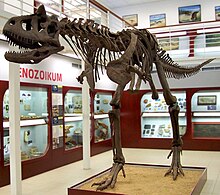Carnotaurinae
| Carnotaurines Temporal range: Late Cretaceous,
| |
|---|---|

| |
| Mounted cast of a Carnotaurus sastrei skeleton, Chlupáč Museum, Prague | |
| Scientific classification | |
| Domain: | Eukaryota |
| Kingdom: | Animalia |
| Phylum: | Chordata |
| Clade: | Dinosauria |
| Clade: | Saurischia |
| Clade: | Theropoda |
| Family: | †Abelisauridae |
| Subfamily: | †Carnotaurinae Sereno, 1998 |
| Type species | |
| †Carnotaurus sastrei Bonaparte, 1985
| |
Carnotaurinae is a subfamily of the theropod dinosaur family Abelisauridae. It includes the dinosaurs Aucasaurus (from Argentina), Carnotaurus (from Argentina), and Rajasaurus (from India). The group was first proposed by American paleontologist Paul Sereno in 1998, defined as a clade containing all abelisaurids more closely related to Carnotaurus than to Abelisaurus.[1]
Classification
- Subfamily Carnotaurinae
- Indosuchus (India)
- Lametasaurus (India)
- Brachyrostra
- Ekrixinatosaurus (Argentina)[2]
- Ilokelesia (Argentina)[2]
- Skorpiovenator (Argentina)[2]
- Tribe Carnotaurini
- Abelisaurus (Argentina)
- Aucasaurus (Argentina)
- Carnotaurus (Argentina)
- Pycnonemosaurus (Brazil)
- Quilmesaurus (Argentina)[3]
Phylogeny
In 2008, Canale et al. published a phylogenetic analysis focusing on the South American carnotaurines. In their results, they found that all South American forms (including Ilokelesia) grouped together as a sub-clade of Carnotaurinae, which they named Brachyrostra, meaning "short snouts." They defined the clade Brachyrostra as "all the abelisaurids more closely related to Carnotaurus sastrei than to Majungasaurus crenatissimus."[2]
| Carnotaurinae |
| ||||||||||||
References
- ^ Sereno, P.C. (1998). "A rationale for phylogenetic definitions, with application to the higher-level taxonomy of Dinosauria". Neues Jahrbuch für Geologie und Paläontologie, Abhandlungen. 210 (1): 41–83.
- ^ a b c d Canale, Juan I.; Scanferla, Carlos A.; Agnolin, Federico L.; Novas, Fernando E. (2008). "New carnivorous dinosaur from the Late Cretaceous of NW Patagonia and the evolution of abelisaurid theropods". Naturwissenschaften. 96 (3): 409–14. doi:10.1007/s00114-008-0487-4. PMID 19057888. Cite error: The named reference "canaleetal2008" was defined multiple times with different content (see the help page).
- ^ http://www.sciencedirect.com/science/article/pii/S075339691300089X
